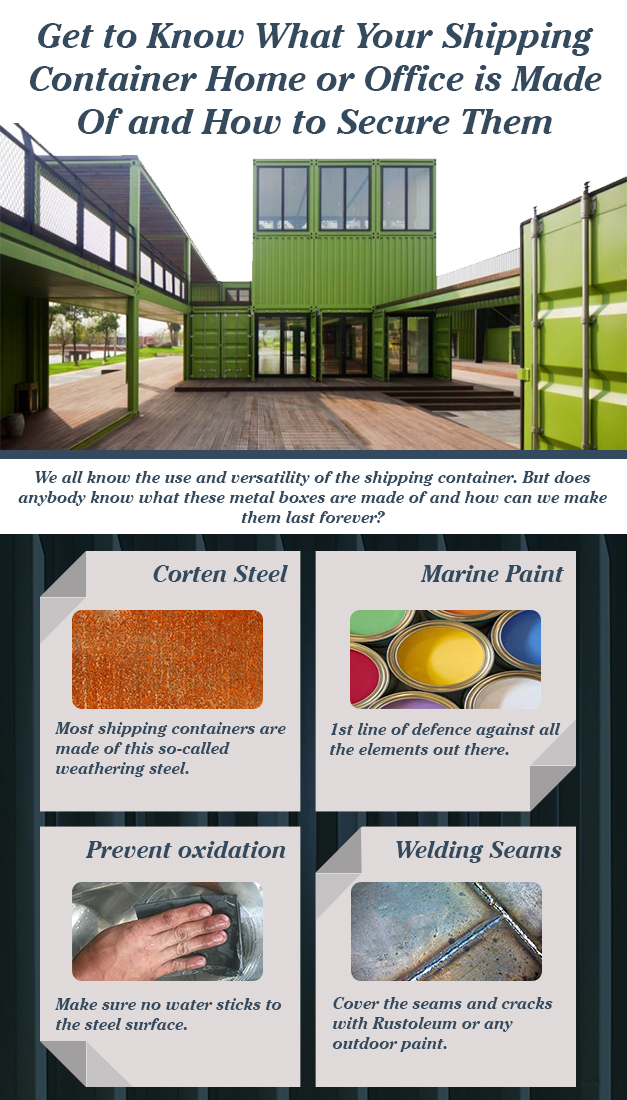#mc_embed_signup{background:#fff; clear:left; font:14px Helvetica,Arial,sans-serif; }
/* Add your own Mailchimp form style overrides in your site stylesheet or in this style block.
We recommend moving this block and the preceding CSS link to the HEAD of your HTML file. */
Shipping containers in Australia have become a popular way of living and working. These sturdy, environmentally friendly units are in abundance, making them a cost-effective and readily available way to set up a home or office. They’re also easy to modify. So how do you prevent corrosion on your shipping container?
What is Corrosion?
Corrosion is the slow process of disintegration of the metal used to make the shipping containers. It can become the bane of your existence if your shipping container is not properly maintained and taken care of.
The primary culprit of corrosion is seawater when the shipping containers are still used to transport goods across the sea. The salt water, coupled with the salty ocean air and the sun, simply wears down the steel structure over time.

What Are Shipping Containers Made Of?
So we know that shipping containers are durable boxes made of steel – but exactly why are they so durable even long after they’ve retired from shipping cargo across the world?
These strong units are designed to carry goods back and forth across the seas, and in so doing, they come up against pounding rain and wind, direct sunlight, and even snowstorms. How do the shipping containers fight against the elements? Simply, they’re built with Corten steel and are so designed to withstand whatever Mother Nature throws at them.
What is Corten Steel?
This type of strong steel is also known as weathering steel. Corten, a trademarked name, comprises a chemical makeup that when exposed to the elements, allows for the early creation of a light rust that will stick to the surface of the steel.
Typically, you’ll also find Corten steels used to build chimneys, bridges, rail cars and towers.
Corten Steel Used on Shipping Home Containers
When factories construct new shipping containers, a thick coat of marine grade paint is applied — the first line of defence against corrosion. The paint helps to protect the container for years to come. But as the container ages, the paint begins to peel off, exposing the Corten steel. The steel then acts as the second defensive layer.
How to Protect Your Shipping Container Home or Office from Corrosion
If you’re using a shipping container for business use, the best way to start is to use shipping containers for sale from Port Container Services. You want to make sure that your container lasts a long time and there are a couple of easy things that you can do to maintain it.
First, Corton steel isn’t only rustproof; it can also greatly slow corrosion. It won’t prevent it altogether but it’s a very tough line of defence.
Second, make sure you pay special attention to any pocket, horizontal area, or dent in the shipping container home or office. If water is able to stick on any surface of steel, the oxidation process will kick in. Make sure you regularly check the container for any required maintenance.
Third, have a look for any welding seams. You should keep an extra coat of Rustoleum or any other type of outdoor paint applied to them to be able to maintain the seams. This type of pain covers smaller chips and cracks that the human eye may not spot.
Buying Shipping Home Containers in Australia
Just about every intermodal shipping container is made from Corten steel. There are, however, other units that are made of fibreglass or aluminium. All three of these are strong, good materials, and serve to cater for different markets.
But as far as a container for home or office use goes, you’ll want a strong, rust resistant and secure structure. And Corten steel containers are the way to go. The maintenance and corrosion prevention requires very little effort.